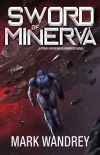Sword of Minerva (The Guild Wars Book 10) by Mark Wandrey (good books to read for teens txt) 📗

- Author: Mark Wandrey
Book online «Sword of Minerva (The Guild Wars Book 10) by Mark Wandrey (good books to read for teens txt) 📗». Author Mark Wandrey
“It’s a nice place; what else is there to do except swim and screw?”
“We do not screw.”
“I am aware.”
“I know. It was humor. Ha. Ha.”
“You’re quite a bit different from Nemo,” Sato pointed out.
“Better or worse?”
“Better, I think. The adventure has been good for you.”
“I believe the experiences gave me a lot to think about. Nemo has limited exposure to the outside world. I will have to ponder this as well.”
Rick followed them a respectful distance behind. He’d acquired a new black hooded cloak, the previous one long gone in combat. He was there mainly for overwatch. Sato now carried multiple weapons, and with his training restored, along with his memories, there weren’t many situations he couldn’t get himself out of.
“Here it is,” Sato said, indicating a sign with the Galactic Union symbol for medicine.
“Very out of the way,” Dakkar noted.
“There are still a lot of beings in the galaxy who are suspicious of pinplant technology,” Sato said as he opened the door. Their last stop before Azure, the planet Fesk’l—or as the Humans called it, Emerald Sea—was a consortium-owned world with beautiful oceans. The problem was, the name came from the deep green waters, which contained levels of copper that would be toxic to Humans. Sato hadn’t visited the planet surface, only passed through long ago. He’d found out about the Wrogul physician from a trader on the orbiting space station.
<I’ll keep an eye out,> Rick commed through their pinplants.
<Thanks. We shouldn’t be long,> Sato replied.
Dakkar was excited, despite his saying it could wait. He’d passed the necessary age to have the implants done shortly after the battle with the Science Guild. Sato had surprised him with his plan when he’d heard about the availability here.
Inside were a robotic attendant and three aliens waiting for care. An elSha with burns on one hand, a Sidar with a bloodily bandaged wing membrane, and a rather small, despondent-looking Oogar holding its jaw. Sato walked up to the robotic attendant.
“You require medical assistance?” the machine asked.
“I have an appointment,” Sato said and gave the confirmation code.
“Accepted. Down the hall, operation room #12. The procedure will cost 11,000 credits.”
Sato paid the robot, who beeped cheerfully and opened the door. Dakkar rolled along behind him, the alien’s deep blue bar-shaped pupils looking at the waiting patients. “Maybe I could help?”
“There are other doctors,” Sato said. Dakkar followed without comment. He smiled a little. Not like Nemo at all.
At room #12, the door popped open to admit them. It was a simple room with a configurable examination table, many locked cabinets full of instruments and medicines, and three waiting chairs designed to accommodate most humanoid physiologies. He wondered if there were Oogar-sized rooms and tried to imagine a Tortantula coming for a sore foot.
He took one of the chairs and waited. Dakkar’s support tank churned nervously around the room as he examined the different shelves and storage bins. Sato wondered if Dakkar would take up medicine someday, following in Nemo’s tentacle marks.
The rear door opened, and an alien of a race Sato had never seen before came in. It looked a little like a Chinese dragon, except it had six limbs, its body was less snake-like, and its mouth was more like a Nile crocodile, long and full of pointy teeth.
“Hello,” the alien said. Its translator was speaking in one of the universal Union languages, and it used pinplants directly, so Sato couldn’t trace the language. He’d already run the appearance through his pinplants and couldn’t find it. “Who is the patient?”
“Me,” Dakkar said, and waved a tentacle out of the water.
The alien gave Dakkar a queer little bow. “The doctor will be in shortly. Has the questionnaire been completed?”
“Yes,” Sato said, and handed the dragon-like being a datachip. It accepted it and slid the chip into a slate design Sato had never seen before.
“I’ll give this to the doctor. He’ll be in here momentarily.”
“If you don’t mind my asking, what race are you?” The door closed without a response. “Well that was rude.”
“How long will this take?” Dakkar asked.
“Not too long,” Sato said. At that moment, the door opened again, and the surgeon flew in. His support unit was, well, fascinating. It didn’t use treads like other Wrogul; it was a miniature flyer, held up by a dozen tiny and highly efficient electric turbines. The water compartment was small, no bigger than an extra-large coffee urn, and it had six little membrane gates the Wrogul could slide tentacles through. “That’s amazing,” Sato said, carefully studying the design. I can copy that, he thought with a grin.
“Hello, Dakkar. You may call me Dr. Faust.” The voice was, like the dragon, in a universal Union language. Sato guessed it was because they saw tons of aliens.
“Hello, Doctor,” Dakkar replied, pulsing colors. There was an unusually long pause.
Sato cocked his head and looked through the porthole, the only place Faust was visible. It was dark inside his mobility flyer, unlike Dakkar, who liked lots of windows so he could see out, and sunlight on his skin. The doctor finally responded.
“Are you ready?”
“Of course,” Dakkar said.
“Please climb onto the table.”
Dakkar’s tank moved next to the table, and he slithered out, causing water to run onto the floor. Meanwhile the dragon was filling several trays on wheels with all manner of instruments, including a see-through plastic box holding what looked like a jumble of threads. Sato imagined this was a Wrogul pinplant. He knew they were more involved, because parts of the Wroguls’ brains were in their arms.
“You will need to leave,” Faust said to him. Sato frowned. “It is difficult to sanitize with you here. Our physiology is different. I assure you, he is





Comments (0)